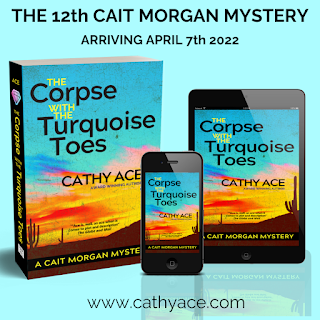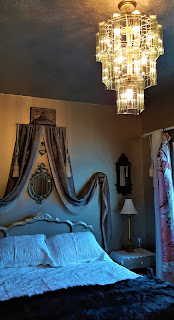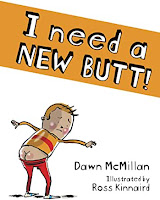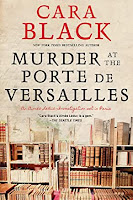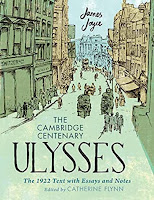| Business:
Book club members are usually free to say anything about the book they
just read. People attending author events usually say nice things or
nothing. But what about when authors visit bookclubs? Do rules exist?
Should we invent them? UK - April, US - June I've never been a member of a bookclub. So my only experiences are as an author attending. And I'm kind of disappointed that there's never been a . . . What would we even call it? . . . my favourite expression for the thing I'm talking about is "a crap on the coffee-table". It would go something like this: Book Club Member 1: Book Club Member 2, we haven't heard from you yet? BCM3 (sotto voce): BCM1! What are you doing? BCM2: I thought we agreed I was going to button it. Catriona: What's this? This sounds interesting. BCM2: Okay, since you ask. I thought this book was pedestrian tripe. Hackneyed, worthless foolishness. A waste of trees. I tried to veto it but I've already used this year's veto to block another one. Catriona: Oh? what book did you block? Who am I in this club with? BCM2: That was your last effort. Also garbage. This has never happened, except in my head. Whenever a BCM is silent, though, I assume this is what she's not saying. But then I over-react for a living. Maybe that silent BCM is hiding the fact that she hasn't read the book. (I wouldn't be offended). Or the fact that she doesn't read much crime fiction and I haven't changed her mind any. (I wouldn't be offended.) And even if this was what she was holding in, and she decided to let it out, and I was offended, it would be a great story. I'd be telling it here. (Without having to make it up.) Yeah, if I had the power to set ground rules for the bookclubs I go to, I'd love to tell everyone to let rip. We've all read horrible reviews of our books anyway - cynical reviews, mean reviews, confident but error-riddled reviews - and we've all been at that signing where people say things so rude they're funny or so wrong they're a kind of genius: "I don't read much. Maybe I'll start when I'm old." "I only read good books." "I didnt know this was set overseas.There should have been a warning." In those settings, the hardest thing is to not respond. Not to say: "Maybe you'll die young." "Tchah! I almost wrote a good one. If only, eh?" "The first word of the jacket copy is 'Edinburgh'." So, getting rinsed at a gathering where a response is the way to go would be a treat! But there I go again, assuming that the quiet BCM is seething with unexpressed emotion about my work. The truth is probably that she's knackered and the last thing she needs at her bookclub is to have to talk about a damn book. Except for this one bookclub I once went to in Berkeley where the BCMs had index cards of character arcs and plot threads. They were absolutely fascinating. And they gave me a cutting of this - currently blooming - succulent too. Cx |
Thursday, March 31, 2022
That which doesn't kill you makes you giggle, by Catriona
Wednesday, March 30, 2022
It was the best of times... by Cathy Ace
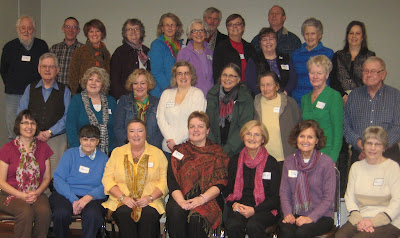 |
| The biggest book club to ever read one of my books" One Book Whonnock read The Corpse with the Silver Tongue almost 10 years ago! |
The book club I belonged to (yes, in the past tense, I’m afraid) was a fun way to meet and chat, and have a focus for discussion about a certain book – but it was a general book club, not all mysteries, so I often ended up reading a book waiting, hoping, longing for someone to die (in the book!) then for the solving to ensue...but, sometimes, it didn't. *sigh*
But what about book clubs I’ve attended as an honored author? Well, first of all, it really IS an honor to be invited to attend. Then there’s the wonderful aspect that you’re able to talk about your book, denouement and all, because everyone’s read it…which is quite a different experience than attending most other bookish events where spoilers aren’t allowed. So, those two aspects make attending a book club as an author a delight.
Then there’s the other, nerve-wracking part of the experience – what will people say about my work? It’s terrifying…but worth it, I think. I’ve never been to a book club (in person, or virtually) where someone’s been intentionally nasty/dismissive/picky about my work…so I’ve always wondered if there’s been a secret agreement made ahead of my arrival to not slam the author. That said, I've never heard of such a rule existing, but maybe that’s all part of the undisclosed part of how each group operates.
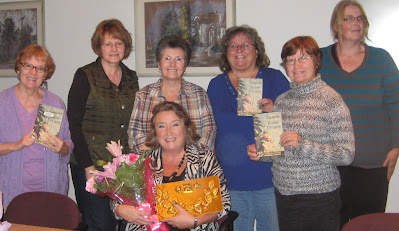 |
| The first book club I ever attended as an author, back in 2012. Look - I even had gifts! And the members were LOVELY! |
I've been fortunate to visit many groups – often online, via Skype or Zoom – and I have enjoyed every experience, though it’s hard to beat the delight of chatting face to face. I’ve even gone so far as to add a sheet of discussion questions designed for book clubs for each of my books (they’re on my website, if you fancy checking them out, here: http://www.cathyace.com/cait-morgan-mysteries ) which I’ve been told are useful – and, no, they don’t include spoilers!
The next book club I’ll attend in person (date TBD) will be the One Book Whonnock group – which really is a very special experience...and not just because I adore the fact that so many of my neighbors will be reading a book I wrote, but also because it's a book that’s set in our neighborhood (The Corpse with the Iron Will, Cait Morgan Mystery #10)! I expect lots of conversations about characters I’ve included, as well as location spotting. I’m hoping no “rules’ will be needed for that one! This is the second time my local community has chosen one of my books to read, and it really gives me the warm fuzzies...and, because I hand deliver a lot of the books, I get to make new chums too!
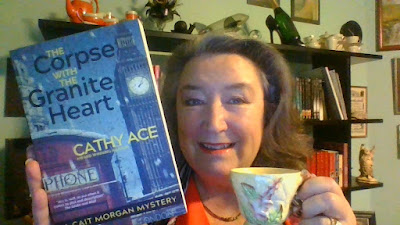 |
| This is the way I meet with book clubs around the world nowadays - with a cuppa, in my office! |
I have dates in the diary to meet with book clubs in various places in the USA, the UK, and Canada - so, if you're looking for a good read, with a set of questions written up for you already, and you'd like me to join you - please don't hesitate...email me and let's talk! Email address is here
Oh, and by the way, my latest Cait Morgan Mystery (the 12th in the series) is set in Arizona…in case you feel the need to virtually experience some heat at the moment. It will be published on 7th April, and is currently available for pre-order for Kindle, Kobo and Nook: http://www.cathyace.com/cait-morgan-mysteries
Tuesday, March 29, 2022
The Case of the New Criminal Mind by Stephen Mack Jones
Welcome to our newest Mind! On behalf of all nine Minds, we're extending a virtual group hug of welcome to Stephen, who joins us today, and will be with us moving forward. Today's post is a chance for all our followers to get to know a bit about Stephen...over to you, and WELCOME!
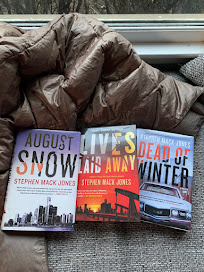 |
| The AUGUST SNOW series |
“I got me a cousin down ‘nere in Monroe County, Arkansas, look just like you,” the handsome elderly Black man said, cataracts forming in his eyes as we spoke. “Tyrese Jesper. Folk calls him ‘Tweety’. Y’all ever know’d each other? His momma? Miss Etti? ‘Cause y’all could be twins, swear to my Lord Jesus.”
“No, sir. I’m afraid I—”
“Look just like Tweety! Got him
a little bit of a belly, too!”
“I, uh—”
For the record, my name is Stephen Jones.
Stephen Mack Jones (a wonderful middle-name bestowed upon me after my maternal
Grandfather McCullough, affectionately nicknamed “Mack”.) And it’s quite
possible, vaguely conceivable, maybe kind of likely I look like a family member, neighbor, old classmate, co-worker,
ex-boyfriend or very distant ethically-challenged, twice removed cousin.
This has been the summation of my looks and, curiously enough, my voice and
what I am told is a distinctive baritone laugh, since I was a long-ago
teenager. White folk, Black folk, doesn’t matter. This includes a young Middle
Eastern man shopping for a sweater at Macy’s who, after staring at me for an
uncomfortably long time, approached me and, his eyes watering, told me I looked
exactly like his recently deceased father.
“Was he a good man?” I asked.
“Very good. Very good,” the
young man said. “The best.”
I shook his hand and said, “Well, here’s
to a very good man. I’m honored to look like him.”
On catalytic-converter-ceramics business
in Shanghai, China, my older brother once elicited stares, discreetly pointed
fingers and snickers by the locals. Come to find out, through the translation
of his Chinese counterpart, the locals thought when my brother smiled, he
looked like the Buddha.
But that’s another story altogether.
Not unlike the other fine folk who
contribute to Criminal Minds, I’m a writer. A novelist, which is a word I’m
still getting used to when the question of my profession occasionally comes up.
Then again, I was in advertising/marketing communications for over thirty-years
and “novelist” doesn’t carry anywhere near the ungodly stench of my former
professional. So, I think I’m getting used to being referred to as a
“novelist.” My books thus far are August Snow, Lives Laid Away and
Dead of Winter all published by the brilliant folks at Soho Press.
A crime-thriller series based around the character of former-Marine and
ex-Detroit cop August Snow who just happens to live in one of my favorite areas
of Detroit: Mexicantown. It’s been suggested that I write an “August Snow
Cookbook” since, between the bloody gunfights, twists and turns, and inferred
sex, my hero loves to cook. Mostly Mexican food along with some Southern
African-American dishes, both honoring the Mexican culture of his late mother
and the African-American culture of his late father. It might be a while before
I get to a cookbook. I’m having too much fun with the bloody gunfights and inferred
sex.
I like writing.
It allows me control over a world that is
otherwise manically out of control.
It allows me the luxury of bringing order
to an otherwise disordered, unpredictable life.
And it allows me to say the word “fuck”
multiple times and have that word considered “literary expression.”
I live in Michigan. The Mitten State.
Bitter cold in the winter. Suffocatingly hot and humid in the summer.
Unbelievably beautiful in the fall. (Contrary to popular belief, there is no
spring in Michigan.) Michigan is a state of contradictions: Wealthy beyond
belief and tragically third-world poor. Educationally advanced and pathetically
stupid. A state of rabid, foaming-at-the-mouth right-wing white superiority
armed militias and a state where races, ethnicities and nationalities join
hands and sing that old Gullah favorite “Kumbaya” between sips of organic lemon
grass smoothies and CBD oil massages. It’s a state where the natural world grows
wild and howls beneath the moonlight and cities slowly growing or quickly die.
Legendary crime writer Elmore Leonard
lived and wrote here.
So did the brilliant Jim Harrison.
And the Great crime-and-cowboy writer
Loren D. Estleman.
Thriller master Steve Hamilton is a
Michiganian (Michigander?) as is Suspense Queen Karen Dionne.
And multi-award-winning undertaker,
novelist and poet Thomas Lynch lives here when he’s not at the family cottage
in Count Cork, Ireland. (Point of clarification: Mr. Lynch has won multiple
awards for his literature, not his mortuary business, though I’m sure he
does a fine job at . . . you know . . . that.)
I have a family that I love immensely and
who also takes pleasure in annoying the hell out of me.
In the coming months, I will join my
Criminal Minds compadres in answering questions concerning the art, science and
voodoo of writing which we hope will provide you--the novice or
professional--with knowledge, encouragement, clarity and pathways to making your
writing life better. I will also enjoy learning from my compadres. And
you.
Frankly, I don’t know that much.
But I’m willing to share.
(By the way: According to a recent DNA
test, I am 63% African-Predominately Nigerian, and 28% Northern European being
a direct descendant of the House of Bourbon’s King Louis XVI. And I am more
Asian-Pacific Islander than Indigenous American. Which is probably why I look
like a family member, neighbor, old classmate, co-worker, ex-boyfriend or very
distant ethically-challenged, twice removed cousin. The remains of my DNA
lineage are, as my wife long suspected, Neanderthal.)
Monday, March 28, 2022
If You Can't Say Something Nice....
Q: Book club members are usually free to say anything about the book they just read. People attending author events usually say nice things or nothing. But what about when authors visit book clubs? Do rules exist? Should we invent them?
-from Susan
I just helped set up a book group of five women in my neighborhood. We meet tonight to discuss our first read, BEWILDERMENT, by Richard Powers. It’s the first time I’ve been in a book club, so all I know is what other people tell me about their experiences as members:
“Sometimes we spend five minutes on the book before we’re catching up on everyone’s news”
“Frankly, I read only a few pages and if I don’t like it by then, I don’t read the rest of it.”
“Turned out no one read the whole book last time, so we talked about the food.”
“We spent so much time squabbling about next month’s read that we never got to last month’s.”
So, there’ s that. As an author, I’ve only done a handful of book club appearances, although I’d like to do more. I was the excuse for a get-together of women who lived in, or were visiting from, Hawaii. They treated me like a rock star at dinner, and it seemed that most of them had actually read my first Dani O’Rourke mystery. Several were on art museum boards, so it resonated with them. They didn’t say anything nasty.
I was invited by a friend to visit her book club, made up of powerful Black women, most of whom are professional leaders in Oakland, again for a Dani mystery, which has a repeating secondary Black character. Turns out they applauded how I presented her, and had lots of questions about where the character came from and what I had planned for her going forward. Elegant home-cooked dinner and an invitation to return that Covid slammed the door on.
Authors don’t get to set the rules for other people’s book clubs, but for our own, I think the first one – and maybe the only one – should be READ THE BOOK!
A new French village mystery comes out March 2023!
Friday, March 25, 2022
Where Do You Store Your Nuts?
By Abir
Where do you keep your ideas? Whether our minor characters are based on people we meet, or our plots are ripped from the headlines, all writers need a way to store nuts for winter and retrieve them later. How do you organise yours? Could it be better?
Wow. Once again the question of the week seems designed to highlight my inadequacies and general uselessness as a writer.
The sad fact is that I’m not organised enough to store ideas anywhere. I tried writing them down in a pad, but then I lost the pad and basically blew my chances of a Pulitzer. In any case, most of my ideas tend to come to me just before I fall asleep, in that hazy grey space between consciousness and oblivion. They always seem brilliant at the time but then when I revisit them in the cold light of day, they are either completely rubbish or too fantastically boring to be worth pursuing.
But I do store stuff - not plot ideas but interesting sentences or turns of phrase that come into my head, or which I overhear on the bus or when I’m eavesdropping on strangers in pubs, restaurants or parking lots. These can be anything from a few words to a couple of sentences of dialogue and I record them in the notes app on my phone, which supposedly syncs with the notes function on my lap top and my ipad. As far as I can tell, this syncing function is capricious at best, recording my shopping lists across all devices without fail but often losing that gem of a sentence I thought of while hiding in the neighbour’s hedge. A lot of these snippets are rubbish, but some are ok, and when it works, this store of sentences are a great way of peppering up a text that I might be writing.
Here’s a couple of them from my phone:
‘A summer dress, trainers and a face tucked into an iPhone.’ – someone I saw on the train, probably.
‘Serve small and serve all.’ – I think that’s a phrase I overheard.
‘The once and future king of America, serving out his exile in Mar-a-lago, his cut-price Camelot.’ – Guess who that’s about.
‘An old man asleep with a smile on his face.’
These phrases give me a lot of joy. I hope I can use them all someday. As for being organised enough to store ideas, well, that's not going to happen.
Have a great weekend.
Thursday, March 24, 2022
Cold Storage from James W. Ziskin
Where do you keep your ideas? Whether our minor characters are based on people we meet, or our plots are ripped from the headlines, all writers need a way to store nuts for winter and retrieve them later. How do you organize yours? Could it be better?
I keep my ideas in a locked box, squirreled away behind a secret panel in my attic. No one knows about this box. Or the panel. I’ve been careful and made sure it will never be found… Oh, wait.
Damn it!
Never mind. None of that is true. Actually, I keep my ideas in my head and in random files on my iPad. These files I name, “Story Ideas.” In fact, there aren’t many ideas rolling around in there anyway. I tend to keep two or three story or book ideas in my head at any given time. Since I’m not a good multitasker, I can’t juggle too many thoughts at once. So I concentrate on a precious few.
While I’m waiting for the perfect moment to dive into a project, I try to keep the ideas fresh and fecund, associating them with some external stimulus or other. A pense-bête or a talisman, if you will. That keeps the ideas coming. Usually it’s a song that communicates the emotion or feeling I want to put into the story. But it can be weather, too. I love listening to blizzards and thunderstorms on my iPad as I doze off for the night. Depending on the theme of my book or story, those noises give me inspiration, even as I drift into slumber’s embrace.
In my ideas files, I write down the plot in the barest minimum of details. Mostly, I jot down a mood or a setting. Sometimes there’s more. For a short story I recently completed, I wanted to stage a murder at a wife-swapping party on New Year’s Eve 1955. I typed up some details about the characters and the style of writing I wanted to try. For instance, I was determined to write that story without any dialogue whatsoever. Not a single quotation mark. And I accomplished that. With great difficulty, by the way. (Do not attempt this at home.) For this particular story, however, I refrained from searching out accompanying audio to play in my ear as I fell asleep.
Wednesday, March 23, 2022
Orderly Chaos
Where do you keep your ideas? Whether our minor characters are based on people we meet, or our plots are ripped from the headlines, all writers need a way to store nuts for winter and retrieve them later. How do you organize yours? Could it be better?
by Dietrich
When fresh ideas for a new novel drift in while I’m engaged in a work in progress, I need to jot it down, or it will likely be gone.
These sparks end up on handwritten scraps of paper, which tend to litter my desk until I find the time to transpose them into a slightly more organized computer file, waiting there until I can get to them. Sometimes what seemed like a great idea when I jotted it down ends up getting tossed out, leaving me asking, “What was I thinking?”
As a rule, I don’t outline a story. I take these idea snippets, and I just start writing, seeing where it goes. New ideas spring from the initial ones, and I expand on them. It’s usually how I make my way through a first draft.
For the next go-round, I expand on the first, and this is where anything that isn’t working gets revised or tossed out. Then I write a careful timeline, making sure the sequence of events makes sense.
For the first couple of novels, I kept unused ideas for future stories, packing them into a leftover file. I’ve never reached into it, finding there’s never a shortage of fresh ideas, so I abandoned it.
Admittedly, I don’t have an elaborate system for keeping story ideas, but I do keep careful character files. I detail physical descriptions, characteristics and backstories, individual strengths and flaws. And while most of the characters’ backstories never make it into the novel, all that info helps grow the characters and helps keep their motivation on course, making for more believable characters.
Writing standalone stories makes it easy to get to know my characters and to keep them clear in my mind, at least until the story makes it through the editing process. After that they start to fade as I begin work on a new story. I guess if I were writing a series, the main characters would likely stay engrained in my mind, and their personal data would just get tweaked through a time progression, and the file would expand into a bible as I move from one story to the next in the series.
Depending on the work in progress, I sometimes shift between works in progress. When I complete a draft of one, I give it some space before returning to it. And I work through a draft of another story, incorporating the bits and pieces that I’ve collected for that one. When I get through that draft, I go back to the first story, working back and forth between the two stories.
Could it be better? I try to stay open to better ways of keeping organized. So, I’ll be reading my fellow Minds posts this week, betting they’ll have some great tips to share.
Tuesday, March 22, 2022
Stashing the Ideas
Terry here, talking about our question of the week: Where do you keep your ideas? Writers need a way to store nuts for winter and retrieve them later. How do you organize yours? Could it be better?
Is it what we mean by inspiration? Is it those those “what if” moments when you overhear a conversation or read something that intrigues you in a book or see a situation that you never noticed before? Those moments are a dime a dozen. They’re everywhere, available to the writer who’s paying attention.
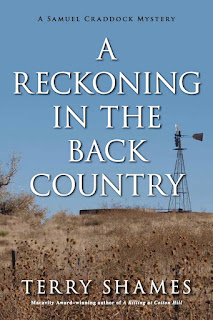 Not him, exactly, but a doctor.
The first question was, how to kill him. It turns out that for some time the idea had been nagging me that I couldn’t write about rural Texas without at some point including the “sport” of dog fighting. You could say I “stored” the idea—but in my brain. I knew it was going to be a really difficult book to write, so I had shied away from it. But if there was any death that seemed fitting for my doctor, it was death by dog. That was when the germ of an idea started to become a story.
Not him, exactly, but a doctor.
The first question was, how to kill him. It turns out that for some time the idea had been nagging me that I couldn’t write about rural Texas without at some point including the “sport” of dog fighting. You could say I “stored” the idea—but in my brain. I knew it was going to be a really difficult book to write, so I had shied away from it. But if there was any death that seemed fitting for my doctor, it was death by dog. That was when the germ of an idea started to become a story. Sunday, March 20, 2022
Filing the Nuts
Where do you keep your ideas? Whether our minor characters are based on people we meet, or our plots are ripped from the headlines, all writers need a way to store nuts for winter and retrieve them later. How do you organise yours? Could it be better?
Friday, March 18, 2022
Books Not Bombs, by Josh Stallings
Q: Banning books - currently in the news again - is the most extreme way to influence others’ reading habits. On a more positive note: what books do you put in your guest bedroom? Buy as presents? Press into strangers’ hands in bookshops? Leave in little free libraries?
A: First off, in a time when political decisions are made based on ten second news blips and bumpersticker slogans to fear books and burn, um, ban them, is insanity. Books are dangerous because they make the reader think. They teach us to hold multiple sometimes opposing ideas and sort them searching for truth, in crime fiction this shows up sometimes as who done it. In Gillian Finn’s Gone Girl it shows us “truth” from two perspectives, both contain lies, and ask us to draw our own conclusions. My mother was an educator, she taught teachers to teach all over the world, she said learning to think and reason was more important than the regurgitation of facts. A very dangerous and wonderful idea.
Erika and I always gave books to children. Hook ‘em young and they will be lifetime thinkers, um - readers. It has been a while since I’ve had young ones in my life so these are a few classics no child should live without.
Where The Wild Things Are by Maurice Sendak. Max and his adventures with the wild things is written sparingly, leaving plenty of room for children for fill in the space with their own imagination.
Where the Sidewalk Ends: Poems and Drawings by Shel Silverstein. Our boys loved this one, it was a great introduction to poetry.
Catherine Called Birdy by Karen Cushman is conceived as a dairy of a 12 year old girl living in 1290. She is a wonderfully defiant strong protagonist. Every section starts with Saints’ Days, laying out the dreadful gruesome ways the saints were martyred. My son Jared loved this book.
Our boys didn’t care what the protagonist’s sexual identity was, or their racial or cultural back ground, they were a Ninja Turtle - James and the Giant Peach - Transformer generation, they grew up on human and non-human heroes mixed. In 2022 it is easier to find books from many cultural perspectives making it easier to gift books to children that both reflect their cultural identity as well as one that opens them to new cultural experiences. Books are our first chance to broaden a child’s world view.
As a young adult our son Jared worked at Borders Bookstore shelving books. He grew up knowing several writers and reading lots of independent writers. He was a rebel with a cause, so chose to turn the book-covers out and stack the end caps with writers he liked and felt deserved greater recognition. I can’t fault his initiative.
When asked, I used to suggest books I knew particular readers would enjoy. Time has made me more subversive. Now I take their taste into account but try and think of books that might stretch them a little. Yes there are tons of amazing books by best selling authors, but there also great books by writers they may not be aware of.
Do you like really scary stories? Or are you a fan police procedurals? Either will give you a door into the entirely unique and utterly terrifying Children of Chicago, by Cynthia Pelayo.
How about a street tough coming of age story? Or a book set in the 90’s? Do you like socially relevant books? Three Fifths by John Vercher is all three, it’s also an unflinching tale of racial stereotypes, and what it’s like growing up biracial in America.
So you like domestic thrillers? Or spy novels? Monday’s Lie by Jamie Mason tells the tale of the cost of growing up with a spy for a mom. If all your childhood games were teaching you spy-craft, how would you fit into an adult world? When you are raised to trust no one, who do you trust?
For adventurous readers looking for something new, short story collections are yummy literary sampler plates. They are the perfect place to discover new voices without having to commit to an entire novel. Here are some I recommend, and not just because I’m in a few of them, but because they are chock full of new and emerging voices.
Murder-a-Go-Go’s an anthology of stories based on the music of The GoGo’s, edited by Holly West.
Shattering Glass: A Nasty Woman Press Anthology edited by Heather Graham.
Alive in Space and Color: 16 Paintings by Great Artists and the Stories They Inspired, edited by Lawrence Block.
Unloaded: Crime Writers Writing Without Guns, edited by Eric Beetner
If reading is a revolutionary act, then libraries are the ramparts we will meet on. Their budgets are tight, they can’t always afford anything but the most asked for books. most accept donations of new books. I have given copies of books to my local and when a reader reached out from a small town in New Zealand saying they didn’t have Young Americans in their library, I sent them one for their shelves.
*****
Author Mark Stevens interviewed me last month and we got real fast. Talked about writing process, policing in America, my son Dylan and much more.
https://markhstevens.wordpress.com/2022/02/25/q-a-91-josh-stallings-tricky/
Thursday, March 17, 2022
If this doesn't put you to sleep . . . by Catriona
Reading: Banning books - currently in the news again - is the most extreme way to influence others’ reading habits. On a more positive note: what books do you put in your guest bedroom? Buy as presents? Press into strangers’ hands in bookshops? Leave in little free libraries?
I made a significant deposit in the wee free library in my town a couple of weeks ago, but it wasn't books. I was clearing out DVDs I knew I'd never watch again, either because I had them off by heart or they were on Netflix anyway. I donated Morse, Lewis, Frost and Vera - the Inspectors - plus Poirot and Columbo. I felt a bit trashy, using a book library for telly, but they've all got a literary pedigree (oh yes they do, see pic). Still, the guilt wouldn't leave me so I went back the next day to remove them. They were all gone. I like to think of someone right now bingeing hard on the best of British telly (and Columbo).
Even more recently, I did a combination of wee free library and pressing books into strangers' hands. I stopped to peruse the contents of one during a walk. And found . . . Anna Katherine Green! (not the one in the pic; that's mine). So of course, I picked it out, waved it at Neil and said "Anna Katherine Green!" plus a tight five on her rightful place in the panoply of the genre. Then I put the book back and we carried on with the walk. But right at our heels someone made a beeline for the library and took that one book, on my recommendation clearly.
When it comes to guest rooms (remember guests?) there was this game I used to play, with pals Job and Roy. Actually, they're called Rob and Joy but Joy loves a spoonerism and, after I said it wrong once, she refused to answer to anything else. They were visiting this one time and chose their own bedside reading. I can't remember what Joy selected but Rob took The Proceedings of the Concrete Standards Board, Northern Branch. 1972. Or it might not have been quite that bad but it was an incredibly boring book.
After that, the game was afoot. I tried to find a book so boring Rob wouldn't still be reading it over breakfast the next day. Pruning techniques, Edwardian geological reports, Japanese poetry in the orginal Japanese . . . He was infallibly interested in everything. But he was also reliably highbrow: didn't (still doesn't) watch television and never listened to Classic FM because they sometimes didn't play the whole opera but only the arias. When I stopped thinking about books I'd find unbearable and reset for Rob's actual brain . . . Booyah! Here's what broke him:
That is to say, I don't know for sure. I know he said "Tripe" the next morning and didn't ask to borrow it, but I can't guarantee that he didn't secretly devour the first few chapters under the blankets and order a copy of his own. As Neil pointed out at the time, you can't wrench open a bedroom door and leap into the middle of the carpet shouting "Aha!". Not if you ever want your guests to come back again.
Cx
Wednesday, March 16, 2022
Do Not Disturb... by Cathy Ace
Reading: Banning books - currently in the news again - is the most extreme way to influence others’ reading habits. On a more positive note: what books do you put in your guest bedroom? Buy as presents? Press into strangers’ hands in bookshops? Leave in little free libraries?
Due to the fact I've just finished redecorating one of our guest bedrooms, I'll focus on that. Why? Well, to be honest, I have absolutely no idea when a real-life "guest" will get to use it - things being what they are, these days - and I'm rather pleased with it, so you can be "my test guest" for now. LOL!
But I think it was worth it, and I hope that - one day, when we're able to host again - someone will have the joy of sleeping in a golden room, surrounded by art with a light touch, and a selection of books that I hope they find interesting.
The two bedside tables have space for books, and I've tried to include a selection that might tickle a range of fancies - so to speak!
Duh...of course I've included some of my own: the two Cait Morgan Mysteries set in Canada (where they are staying) and the collections of short stories and novellas (in case they aren't staying for long).
Other titles about Canada and our part of it are also featured.
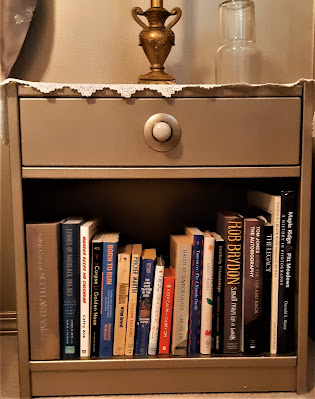 |
| For those who sleep on the left side of the bed |
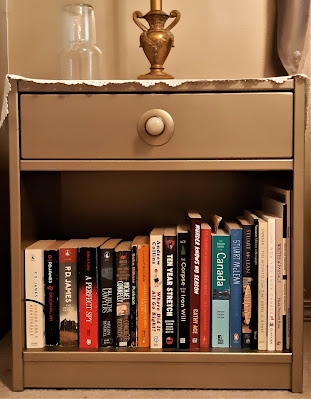 |
| For those who sleep on the right side of the bed |
I've also included books about Wales/Welsh people, a flurry of crime and non-crime fiction, and some inspiring books too. Go on, you can stretch that screen of yours to read the spines I'm sure!
On a non-bookish note, I am delighted that I finally get a chance to display linens that belonged to, and were worked by, my paternal grandmother: this tablecloth was in use at home in Wales throughout my childhood, so it's lovely to see it doing its job again.
Grandma Ace even did all the lacework around the edge of this runner - she had a great deal more patience than I do.
The room's ready - the books have been arranged...now all we need is a guest or two to make it all feel like home again.
Oh - and just to prove I have been writing, as well as painting - I have a book coming out next month: The Corpse with the Turquoise Toes is the 12th Cait Morgan Mystery, and you can find out all about it here: http://www.cathyace.com/cait-morgan-mysteries
Monday, March 14, 2022
Pssst...Got a Book?
Q: Banning books - currently in the news again - is the most extreme way to influence others’ reading habits. On a more positive note: what books do you put in your guest bedroom? Buy as presents? Press into strangers’ hands in bookshops? Leave in little free libraries?
-from Susan
It must be pointed out that the futility of banning books is a given. There is nothing more likely to increase interest, sales, and sharing among readers books like LADY CHATTERLEY’S LOVER, ULYSSES, or I NEED A NEW BUTT (Dawn McMillan) than having some pursed mouth, sanctimonious someone decide it needs to be cast out of sight.
Around here, we give lots and lots of books as presents. It’s a standing joke in my family that as they pick up one gift-wrapped, solid rectangle after another from under the Christmas tree, they hold it up, shake it, and say, “I wonder what this is?” Everyone reads, so the types of books vary according to their passions. The newest Kim Stanley Robinson sci-fi, which seems only a step ahead of reality for one. Environmental issues for another. Futurist thinking, urban design, novels with diverse and infrequently heard voices, natural history, regional cooking, breadmaking, and unexplored cuisines. I’ve given all of Ed Lin’s Taiwan night market crime fiction books as presents, the last of that series being 99 WAYS TO DIE. (Great fun – recommended.)
It feels too bossy to stalk strangers browsing in bookstores, but I recently said in a low voice to someone holding a copy that Cara Black’s newest release, MURDER AT THE PORTE DE VERSAILLES, was bound to be good. Since she had just come from the same talk by Cara that I had, she gave me a look that I translated as, “Duh.” My preferred approach is to say in a bright voice and with a big smile, ”Oh, I have that too. It’s great!” (I say that about all of your books, Minds, when I see anyone contemplating them.)
We used to have two little free libraries on our street. Now we only have one and it seems to be curated toward the kinds of books the pursed mouth, would-be censor would approve of, with more than a reasonable helping of books that promise religious satisfaction, quick riches, increased self-confidence, and cleaner closets. I was thinking of putting ULYSSES in there just to see what happens….



